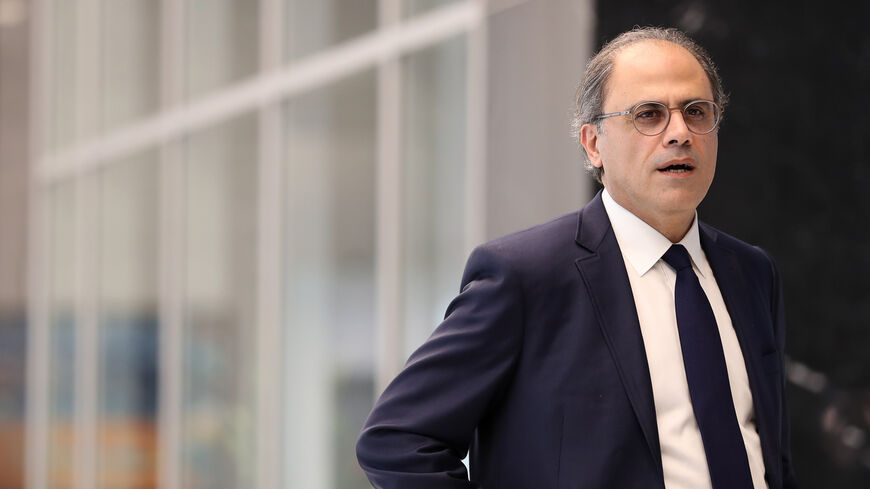BEIRUT — Lebanon’s main Christian and opposition parties have officially endorsed the former minister and International Monetary Fund (IMF) official Jihad Azour as a presidential candidate this week, signaling rare unified moment around a technocratic figure in an attempt to break the ongoing deadlock in the process.
Azour, 57, is known for his financial expertise, mild demeanor and non-affiliation with any of the big political parties in Beirut. He emerged as a consensus candidate for rivaling Christian parties and independent opposition in the parliament. His nomination is a response to the militant party Hezbollah endorsement of Suleiman Frangieh, another Christian figure who is close to Syria and Iran.
The Lebanese parliament has failed more than 10 times to pick a president since the departure of former President Michel Aoun from office in late October, leading to a months-long presidential vacuum as the country grapples with a devastating economic crisis.
Azour's nomination suggests a direction from the Christian parties to veto Frangieh's candidacy, even from the Free Patriortic Movement which broke ranks with its ally Hezbollah in endorsing the IMF senior official.
The FPM's head Gebran Bassil was the first to announce his support for Azour over the weekend.
“We have crossed paths with other parliamentary blocs and agreed on the [nomination] of Jihad Azour among other suitable and nonprovocative candidates, which is a positive and important move,” Bassil said in a speech at a dinner organized by the FPM in the city of Byblos (Jbeil).
The 32 members of parliament supporting Azour include representatives of the opposition, the Lebanese Forces, the Phalanges (Kataeb) Party, as well as independent parliamentarians, namely Michel Moawad, who was a candidate earlier in the process.
Speaking at the Sunday press conference, Moawad withdrew his candidacy and threw his support behind Azour.
“We — as opposition forces — cannot remain idle in the face of disruption and [imposition of] control,” he said in reference to Hezbollah, adding that the only option was Azour, who secured an almost Christian consensus.
“He is an acceptable candidate and is able to protect Lebanon from further collapse and domination,” he added.
But Hezbollah, which holds a major sway in Lebanon’s political life, insists on the nomination of Frangieh. In comments after Azour’s nomination was announced, Hezbollah member of parliament Hassan Fadlallah described him as a candidate of “confrontation and challenge.”
“Don’t waste your time and efforts, the candidate of challenge and confrontation will not arrive at Baabda [presidential palace], whatever his name is. We will prevent them [other political parties] from achieving their goals. They will not succeed in imposing their candidate on the rest of the Lebanese people, neither constitutionally, nor politically, nor through the media,” Fadlallah said during a speech at an event in south Lebanon on Sunday.
Parliament speaker Nabih Berri, who is also the head of the Shiite Amal Movement, has set a new session for the election of a head of state for next Wednesday. Azour would need to garner 65 votes in the 128-member parliament to move to the next round of voting.
Who is Jihad Azour?
Azour hails from the city of Sir al-Danniyeh in north Lebanon. He has a doctorate in international finance (with high honors) from the Institut d'Etudes Politiques de Paris, and he served as postdoctoral fellow at Harvard University's Department of Economics from 1994 to 1996, working on research projects on emerging economies and their integration into the global economy. He also holds a master's degree in Applied Economics and Finance from the Universite Paris Dauphine.
He hails from a political family. His uncle Jean Obaid was a renown parliamentarian and foreign minister of Lebanon from 2003 to 2004
Azour's career in Lebanese politics began in 1999, when he worked as project director of the United Nations Development Program at the Ministry of Finance. From 2000 to 2004, Azour served as senior adviser to the prime minister and finance minister, before himself being appointed minister of finance in 2005 under the government of Fouad Siniora. During his tenure as minister, until 2008, he oversaw the implementation of major reform projects in Lebanon’s financial sector, including the modernization of the tax and customs systems. The modernization program earned Lebanon in 2007 the United Nations Public Service Day and Awards for “Taxpayer Service.”
“The Ministry of Finance has improved services delivered to taxpayers, their quality and timeliness making it comparable to international standards,” according to the UN.
His reform program was also presented at the Paris III Conference of Donors in 2007, for which the conference provided $7.6 billion in financial aid and soft loans to Lebanon.
Azour also held various positions in the private sector. During the early 1990s, he was a management consultant at McKinsey & Company and later served as managing partner of AM&F Consulting. From 2009 to 2012, he joined US consultancy Booz & Company as senior executive adviser.
In 2017, Azour was appointed IMF director of the Middle East and Central Asia department, tasked with overseeing the work of the IMF in the Middle East, North Africa, Central Asia and the Caucasus.
Azour’s nomination comes as Lebanon teeters on the verge of total economic and financial collapse. Talks with the IMF have stalled since last year, despite the urgency of an aid package to help resolve the country’s economic crisis. Meanwhile, international donors are insisting that the Lebanese government enact major reforms in the public sector for any assistance.
If elected, it remains to be seen whether Azour’s financial background and neutral political stances will help the country get back on its feet after more than four years of economic and social chaos.







